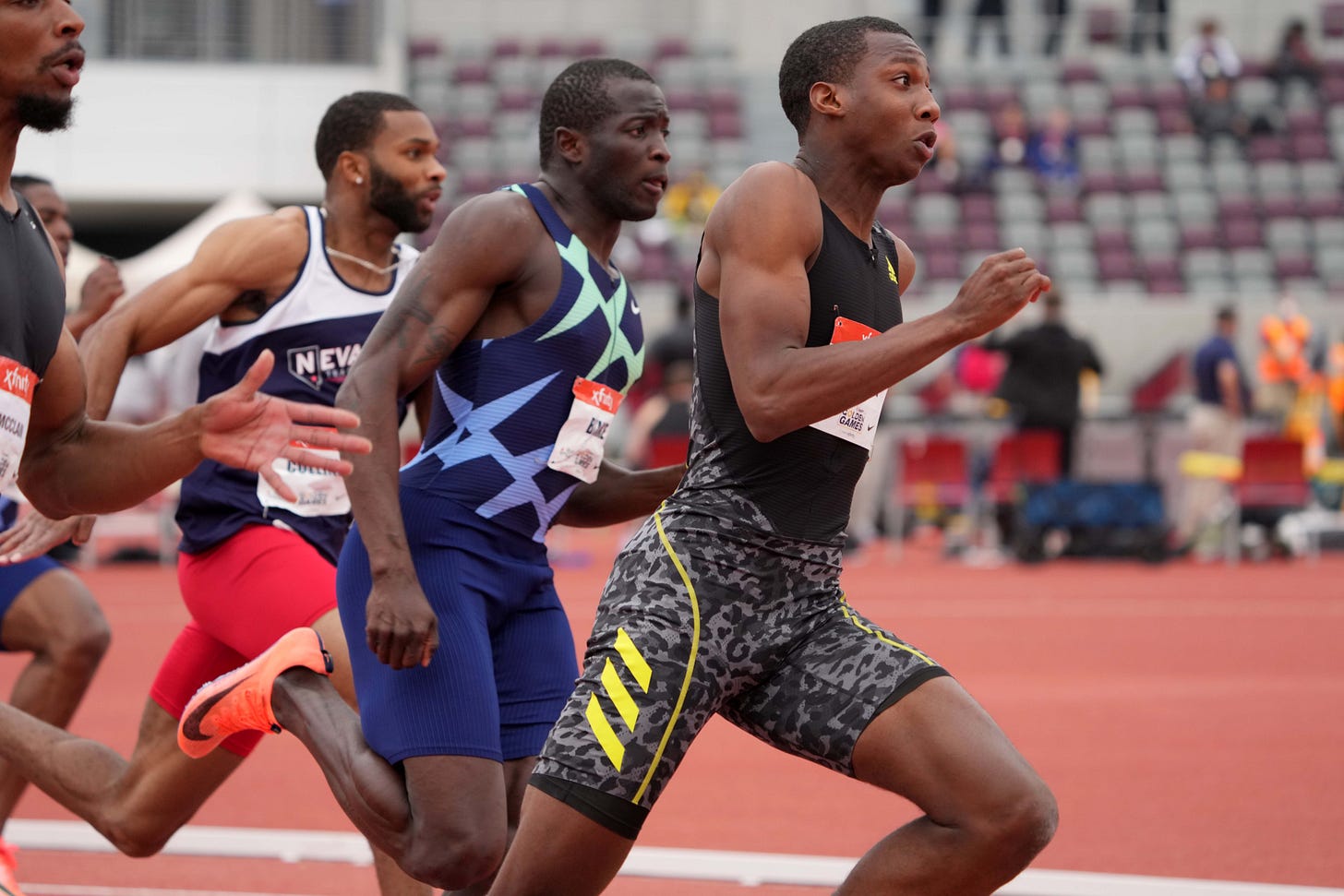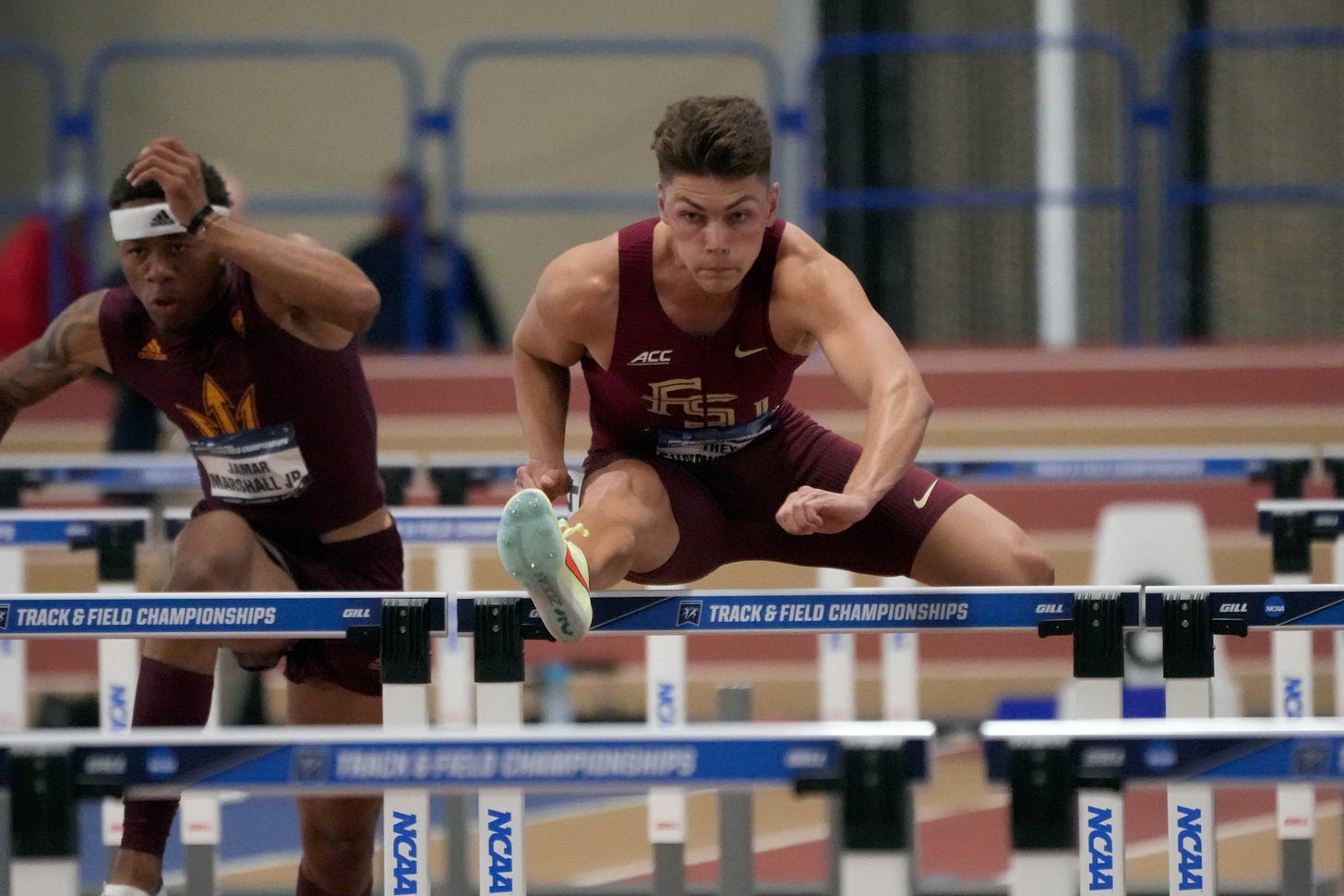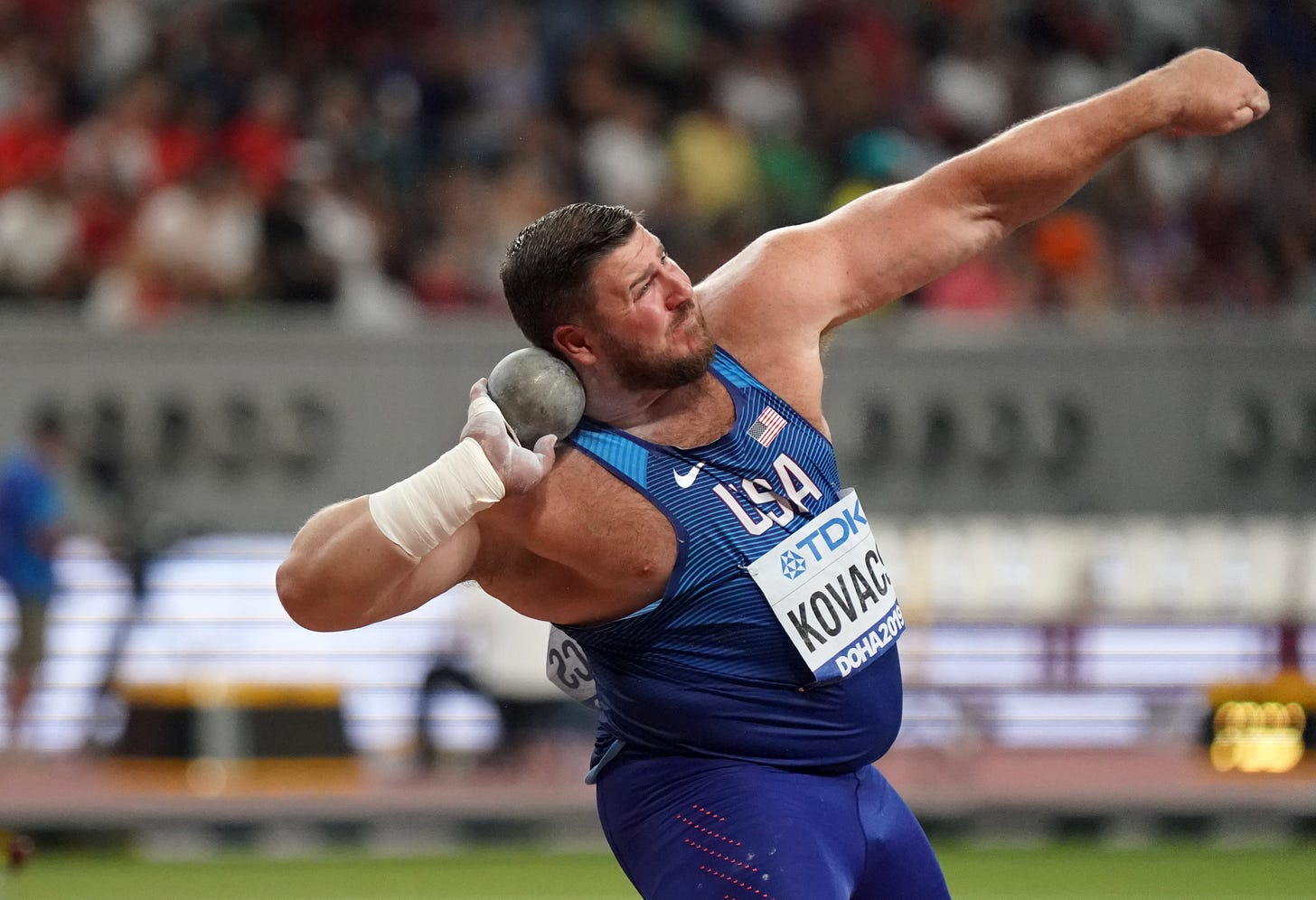Week in Review: Knighton takes huge step forward
High school senior moves to fourth on all-time world list in 200 meters

I may have been wrong about Usain Bolt.
When the Jamaican great retired after the end of the 2017 season, I figured it could easily be 20 or 25 years before the track and field world was once again graced by the presence of a male sprinter as talented as him.
Less than five years later, an 18-year-old senior at Hillsborough High School in Tampa, Florida, has me thinking that Bolt’s 200-meter world record of 19.19 seconds set in the 2009 World Championships could fall in the next two or three years.
Erriyon Knighton burst onto the world scene last year when – among other things – he finished third in the men’s 200 in the U.S. Olympic Trials, fourth in the Olympic Games in Tokyo, and lowered the world junior (under-20) record to 19.84.
On Saturday, he obliterated that world junior record when he ran 19.49 to win the 200 in the LSU Invitational at Bernie Moore Stadium in Baton Rouge. The time was the eighth fastest in history and moved Knighton to fourth on the all-time world performer list. It also left him with a massive margin of victory over second-place Joseph Fahnbulleh of the University of Florida, who ran 19.92.
Defending NCAA champion Fahnbulleh had finished .05 seconds behind Knighton in the Olympic Games while representing Liberia, but he was never in the race for first on Saturday.
Knighton, running in lane five on the nine-lane track, made up the stagger on Fahnbulleh, who was in lane six, within the first 30-35 meters of the race and entered the home straightaway with a lead of two-plus meters on second-place Dorian Camel of LSU, who would finish third in a personal best of 20.00.
Fahnbulleh made his typical late-race charge in the final 50 meters of the race to finish second, but he never came close to the smooth-striding Knighton, who is now the second-fastest American in history behind Michael Johnson, who ran a then-world record of 19.32 in winning the 1996 Olympic title.
Knighton has since posted a one-minute video on his Instagram account with the caption “if only you knew what i had to sacrifice to get here … 19.49”.
Three tenths of a second – the difference between Bolt’s world record and what Knighton ran Saturday – is a significant gap in a 200-meter sprint. But Knighton’s age and relative newness to the sport of track and field are two things that are most exciting about him.
Bolt stamped himself as a sprint prodigy in 2002 when he ran 20.58 in the 200 and won the World Junior Championships before he turned 16.
In contrast, Knighton did not start running track until his freshman year in high school in 2019. He displayed enormous potential by running 21.15 in the 200 that season – when he was 15 – before clocking 20.33 in 2020 and 19.84 last year.
His current best of 10.04 in the 100 pales in comparison to Bolt’s world record of 9.58 from the 2009 World Championships, but it is important to remember Bolt was regarded as a 200-meter specialist until 2008 when he ran world records of 9.72 and 9.69 in the 100.
As brilliant as he ran the other day, Knighton’s performance does not guarantee him anything for the remainder of the season.
Andre De Grasse of Canada and Americans Kenny Bednarek and Noah Lyles, the top three finishers in the Olympics, will not willingly give an inch to Knighton. Nor will versatile Fred Kerley, the Olympic silver medalist in the 100 who placed fourth in the 200 in the Olympic Trials.
However, Knighton is five years younger than the youngest of them, and he is the one who appears to have the best chance of lowering Bolt’s world record in the next few years.
Another personal best: Favour Ofili of LSU became the fastest teenager in African history when the junior from Nigeria ran 10.93 to win the women’s 100 meters in the LSU Invitational.
The mark lowered her previous best of 11.00 set three weeks earlier on the same track, moved her to second on the yearly collegiate list behind Kentucky junior Abby Steiner (10.92) and to fifth on the all-time African performer list.
It also came 15 days after she set a collegiate and Nigerian record of 21.96 in the 200 to win the Tom Jones Memorial meet at the University of Florida.
Gator power: Jasmine Moore of Florida led the Gators to a 1-2-3 finish in the women’s long jump in the LSU Invitational when her season best of 6.82 meters (22 feet 4½ inches) strengthened her hold on the No. 3 position on the yearly collegiate list.
Behind her, fellow sophomore Anna Hall finished second with a wind-aided mark of 6.74 (22-1½).
Hall is scheduled to compete in the heptathlon in the USA Track & Field Combined Events Championships at John McDonnell Field in Fayetteville, Arkansas, starting Friday.
If she places among the top three finishers and totals 6,420 points or more, Hall will automatically qualify for the U.S. team that will compete in the World Championships in Eugene, Oregon, from July 15-24.
Fast sprint times in Botswana: Letsile Tebogo of Botswana broke the world junior (under 20) record in the men’s 100 meters on Saturday when he ran 9.96 in a meet in the Botswanan capital of Gaborone.
The time, which cut a hundredth of a second off the previous record of 9.97 set by Trayvon Bromell of the U.S. in 2014, was run at an altitude of a little more than 1,000 meters (3,300 feet).
With his performance, the 18-year-old Tebogo became the first Botswanan and the 28th African to break 10.00 in the 100.
Christine Mboma of Namibia, also 18, won the women’s 100 in a Namibian record of 10.97 and the 200 in 21.87, the fastest time in the world this year.
Win one, lose one: Trayvon Bromell and Andre De Grasse split a pair of races in the North Florida Collegiate Invitational at Hodges Stadium in Jacksonville on Saturday.
With a wind-aided 9.75, Bromell easily beat second-place De Grasse (10.07) in the 100. But Olympic champion DeGrasse edged Bromell, 20.67 to 20.69, to win the 200.
Bromell’s time in the 100, which was aided by a wind of 2.1 meters-per-second, was the fastest in the world this year under any conditions.
False start: Devon Allen might not have run the fastest time in the world this year when he ran 13.11 to win the Olympic development race of the men’s 110-meter high hurdles in the Penn Relays on Saturday.
That’s because Trey Cunningham of Florida State ran a personal best of 13.10 to win the high hurdles in the North Florida Invitational on the same day. And that race appeared to have been run about 20 minutes before Allen ran his race at Franklin Field in Philadelphia.
Cunningham, a senior who was the second-best 60-meter high hurdler in the world to world champion Grant Holloway during the indoor season, moved to fourth on the all-time collegiate performer list with his performance. He had preceded his 13.10 clocking by running a then-personal best of 13.15 in a qualifying heat earlier in the day.

Distance slugfest: Teams from Arkansas and North Carolina State staged a thrilling duel in the college women’s 4 x 1,500-meter relay in the Penn Relays on Saturday that resulted in the two fastest collegiate times ever run.
Arkansas had the lead after the first and third legs of the race, but NC State led after the second leg. Wolfpack anchor runner Katelyn Tuohy overtook Arkansas’ Krissy Gear with about a lap and a half left in the race. But Gear stuck close to her and retook the lead with about 230 meters to go before pulling way for a winning time of 16 minutes 53.87 seconds that crushed the previous collegiate and Penn Relays record of 17:08.34 set by Tennessee in 2009.
North Carolina State also bettered the previous best with its 16:55.19 clocking.
Isabel Van Camp ran 4:16.8 for Arkansas on the first leg. She was followed by Logan Jolly, who ran 4:13.9, Lauren Gregory, 4:12.5, and Gear, 4:10.7.
Anna Vess ran 4:17.4 on the first leg for North Carolina State, and she was followed by Samantha Bush (4:10.9), Savanah Shaw (4:17.1) and Tuohy (4:09.8).
Collegiate record disagreement: Mykolas Alekna of Cal Berkeley and Lithuania had one of the best series in the men’s discus throw in collegiate history in the Golden Bears’ dual meet victory at Stanford on Saturday.
However, there is some question about where the freshman’s top throw of 67.68 (222-1) ranks on the all-time collegiate list.
According to the United States Track and Field Cross-Country Coaches Association (USTFCCCA), Alekna’s throw added two centimeters to the former collegiate record of 67.66 (220-0) set by Hannes Hopley of Southern Methodist and South Africa in 2004.
But Track & Field News lists the collegiate record at 68.16 (223-8), set by Julian Wruck of UCLA and Australia in 2013.
The USTFCCCA lists Wruck’s mark as an exhibition performance because it came in a meet in which all of the discus competitors were allowed to have three throws in a qualifying round, which was followed shortly thereafter by a final in which every competitor was given six more attempts.
Tom Lewis, director of media, broadcasting and analytics for the USTFCCCA, said that type of “continuous” competition was inconsistent with the way in which the discus is typically contested at the NCAA level. Therefore, Wruck and the other throwers in the competition were deemed to have had an unfair advantage when it came to the marks they produced.
Making his presence known: Joe Kovacs had the four best outdoor efforts in the world this year while winning the men’s shotput in the Outdoor Music City Challenge at Vanderbilt University on Saturday.
The two-time World champion hit his best mark of 22.46 (73-8¼) on his sixth – and final – effort. He also had puts of 22.09 (72-5¾) in the first round, 22.12 (72-7) in the third round, and 22.05 (72-4¼) in the fifth.

World hammer leader: Brooke Andersen increased her yearly world leading best in the women’s hammer throw to 79.02 (259-3) in the Desert Heat Classic at the University of Arizona on Saturday.
The No. 6-ranked thrower in the world last year threw 74.34 (243-10) in the first round and 77.98 (255-10) in the second before unleashing her top mark on her third attempt.
The effort topped her previous personal best of 78.18 (256-6) from last year and moved her to fourth on the all-time world performer list.
Collegiate discus leader: Jorinde Van Klinken of Arizona State and the Netherlands raised her yearly collegiate best in the women’s discus to 64.75 (212-5) in winning the event in Desert Heat Classic.
The defending NCAA champion currently has the 12 farthest collegiate throws in the country this year.
Collegiate hammer leader: Logan Bloomquist of Southeast Missouri State produced the best collegiate mark in the U.S. this year when he won the men’s hammer throw with a toss of 73.18 (240-1) in the Tiger Invitational at the University of Memphis on Saturday.
Bloomquist unleashed his winning effort in the sixth – and final – round, and also had throws of 70.40 (231-0) in the fourth round and 72.02 (236-3) in the fifth round.
Solid opener: Dalilah Muhammad made her first 400-meter hurdle race of the season a good one as she ran a yearly world-leading time of 53.88 in the Drake Relays in Des Moines, Iowa, on Saturday.
The Olympic silver medalist finished a second ahead of runner-up Gianna Woodruff.
Anna Cockrell, third in the Olympic Trials last year, placed third in 55.09. Shamier Little, the No. 4-ranked performer in the world last year, placed fifth in 56.00.
Raising the bar: Lamarra Distin of Texas A&M set her second Jamaican record of the year when she cleared 1.97 (6-5½) to win the women’s high jump in the Alumni Muster at Cushing Stadium in College Station on Saturday.
The runner-up in the NCAA Championships last year cleared 1.86 (6-1¼) and 1.90 (6-2¾) on her first two attempts of the competition. She then cleared 1.94 (6-4¼) and 1.97 (6-5½) on her second attempts before missing three times at 2.00 (6-6¾).
Her winning height is the highest outdoor jump in the world this year and moved her into a tie for fourth on the all-time collegiate list.
Catching up: It has come to my attention that Sadie Engelhardt of Ventura High School in California lowered her national freshman record in the girls’ 3,200 meters to 9:50.69 in the Ventura County Championships at Moorpark High on April 23.
The mark bettered Engelhardt’s previous best of 10:00.60 and moved her to seventh on the all-time national list and to third on the all-time California list.
Engelhardt’s national freshman record of 4:35.16 in the mile ranks fourth on the all-time national list.






Very interesting stuff. I look forward to each one. Hope to see you and Brenda at Karen’s crew ball game on May 22